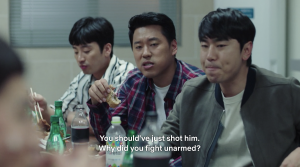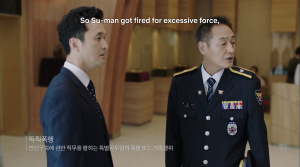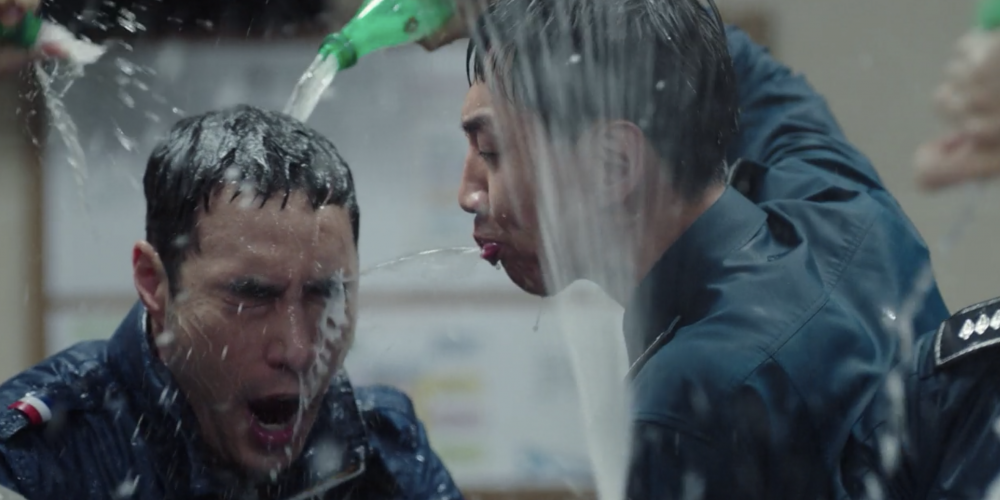Author: Sophie Rock
Synopsis:
In episode 13 of the South Korean police drama Live, the Hongil Police force finally catches the serial rapist they were searching for in previous episodes. Oh Yang-chon’s mother passes with use of “death with dignity,” and Gi Han-sol’s daughter gets married, still (like everyone else) unaware of her father’s sickness.
Discussion:
During episode 13, a small debate about whether or not police should be armed results in an inconclusive outcome. Later, when discussing the result of a previous police officer’s use of force, a definition appears on screen explaining “excessive use of force.” These examples highlight a larger ongoing global debate about gun control and the use of excessive force by the police, as well as a dilemma officers must face between discipline and their own safety.


Gun use and access in South Korea is highly inaccessible. The KNPA estimate 84,414 privately owned guns in South Korea, which is only roughly 0.27% of the population (Jang 2018, 13). Even with such a small percentage of the population owning guns, it is reported that “all guns must be stored at the local police station, and all permits require extensive background checks… including documents to prove legitimate reasons for gun ownership, and physical and psychiatric assessments” (Jang 2018, 14). These regulations make gun access a seemingly nonissue for civilians, but how about the South Korean police?
When discussing the use of guns in Live, one police officer comments “When a cop uses a gun, it’s not the suspect who dies, we’ll [the police] die from the penalty” (ep. 13, 19:10). This may be due to the fact that individuals in South Korea have little access to guns, so the police should have little to worry about in terms of their safety (Ivkovic 2012, 93). But yet, in episode 13, a suspect was a trained martial artist, hence not requiring a gun to inflict harm upon officers. Although the use of weapons may seem justifiable, later in the episode, viewers are introduced to an ex-police officer, So Su-man, who was fired for his use of excessive violence (ep. 13, 38:17). Here, it is obvious that the penalties on officers who use unnecessary force is a prime concern in whether or not officers use weapons for their own safety.
The excessive use of force employed by South Korean police reigns supreme among civilian complaints (Kang 2011, 178). Despite this large complaint, the use of deadly force is relatively uncommon in South Korea, and if applied, it nearly immediately becomes a public issue (Ivkovic 2012, 98). Episode 13 highlights awareness by defining excessive force to its Korean viewership when being discussed. This suggests that this term is relatively new in Korean dialogue and may have become more of interest with the recent debates on the police force.

독직폭행- “A kind of violence that officials who have governmental power commit (such as arresting or imprisoning) by abusing their power.” Shin Haewon (UBC Student)
Episode 13 of Live highlights the concerns officers face in what types of force to employ, fearing more for the disciplinary action they will face, rather than their own safety. The conversations within the episode highlight the ongoing debate that is happening around the globe about police brutality and gun rights. When it comes to these debates, I ask you to consider the following:
- Should police officers be armed at all times?
- Do you feel more or less safe when a police officer is carrying a gun? Why do you think you feel this way?
- What steps and processes are necessary if an individual wishes to own a gun?
Word Count: 476
Bibliography:
Ivkovic, Sanja Kutnjak. “Police Integrity in South Korea.” Policing: An International Journal of Police Strategies & Management 35, no. 1 (2012): 76-103.
Jang, Ho Kyeong. “How South Korea got rid of its Gun Problem.” Published February 27, 2018. https://www.koreaexpose.com/how-south-korea-got-rid-gun-problem/
Kang, Wook and Mahesh K. Nalla. “Perceived Citizen Cooperation, Police Operational Philosophy, and Job Satisfaction on Support for Civilian Oversight of the Police in South Korea.” Asian Journal of Criminology 6, no.2 (2011): 177-189.

Hi Sophie
Thanks for shining some insight about Korea’s police service and system. I really wanted to talk about this issue as well as the way people view and respect police in Korea compared to Canada. In my point of view, the core principles of police are the same in most countries but the biggest difference I feel, having lived in both Korea and Canada, is how they are treated differently. We have seen how politicians and people of high power get to toss the police around in Korea and bend the rules with the popular phrase “Do you know who I am!?” Even amongst civilians, the police are not viewed as the ultimate safe keepers as much talk about back-hand deals are constantly popping up. Moreover, what I personally felt was the size and strength of the police in Canada compared to Korea. When we take a look at our local Vancouver Police Department, vast majority of the police officers are significantly larger and bulkier than the police we see in Korea or Live. With this in mind, people have a tendency to avoid challenging the police in Vancouver as they realize that they cannot physically beat and win over the police.
Word Count:
203
Thank you for sharing your experience in both Korea and Canada, that adds some really valuable insight to these questions! I definitely wouldn’t want to attempt to physically harm any police officer I encountered, but that may be because I was raised in North America, where police are so large, powerful (and armed).
I feel that police officers should be armed at all times, because they are the ones that are protecting citizens from varieties of crimes. They could be facing criminals with weapon, someone with larger body size, or groups of criminals. If the police officers do not have the gun with them, I feel like it will be difficult for them to handle serious cases or protecting the citizens. I find that it is weird for Korean officers to hesitate when using the gun in the necessary situation because of the law/protocol. Police officers should be the ones to judge by themselves when to use the gun or not, because they are professionally trained people and are there for the people. For example, if a criminal is holding hostage with knife, it is crucial for the officer to act swiftly and save the hostage. Therefore, using the gun to immobilize the criminal and to take the knife away would be one of the right choices. However, because of the law if the police did not carry gun, how are they going to approach to the criminal to arrest he or she and save the hostage without harming the hostage or be in the danger of officer receiving severe wounds. I think police should have the gun for their safety and as well as our safety. I also think the Korean enforcement law for police should change if they really think about the officers environment and the civilians rights and safety.
This is so interesting! This is becoming a large issue in the United States, as people are starting to question the judgment of police officers when it comes to the use of weapons. Obviously, in life-threatening situations, it is understandable. But these days, people the lines between life-threatening and not potentially fatal are becoming blurred. (Due to a lot of racial and personal bias). I wonder how this would play out in South Korea.
Whenever I watch Live, it feels like it’s criticizing the whole Korean Society while trying to let people know the reality. Gun use in Korea is prohibited and I personally believe that it is a law which people actually like and agree on. However, I think that gun usage of police officers should be more ‘open’ because it feels like that the police officers are scared to use the gun because they might be accused of excessive use of force. Because of that, police officers tend to let the criminals go since they are more scared about losing their lifetime jobs than letting the criminals go. I believe that this is a really sad but understandable point; if I were a police officer, I would be more scared to fire the gun, thinking that the person might be killed by my gunshot and that I might get fired because of such incident. As a citizen, we think that police officers should do their jobs properly, not thinking about their own profits. However, before we criticize ‘all’ the police officers, we should put ourselves in their positions, thinking about the choices that we would make as a person, not a police officer.
word count:201
I didn’t know that Korean society generally agrees on the gun laws! That is super interesting. The law sounds incredibly strict to me, though not bad in any way. But I am surprised that, with such a strict law, many civilians agree on it!
I think police officer should be armed all the times because they are more likely to face dangerous situation, so to protect themselves and victims from dangerous situation without any harms, they should be armed. Also, some Koreans do not respect Korean police officer because some police officers show incompetent skill and are not armed all the times, so if police officers are armed all the times, the Koreans may feel respect for them and realize how police officers do dangerous works for our safety.
I feel more safety when I see the Canadian police officers carrying a gun, but I feel less safety when the Korean police officers carry a gun because most Koreans, including me, already know that Korean police officers should not shoot the gun, and as Live showed, if they shoot, they are punished such as dismissal or probation, even though they shoot in dangerous situation. I believe that many Koreans may feel less safety from Korean police officers due to the reasons that I mentioned, so I think the law, which is prohibition of gun, should be amended and make an exception to police officers to change the negative perception towards them. If the law changes, with the carrying a gun, Korean citizens may feel more safety at least, and police officer can protect themselves from the dangerous situation.
(word count: 224)
There are many ways to show power, but I think police officers should be armed at all times. Police officers are put in to their position to help enforce the law and to punish the ones that disregard. Yet, if they are put in important positions to be in charge with no authority, I wonder how are they going to execute given duties. I feel like unarmed police officers are like dodgeball players on offense without a dodgeball. They are unable to punish the ones that underestimate potential consequences they may receive. By this, I am not implying that police officers should be the ones to scare people, or have guns just to punish anyone that argues. As demonstrated by Korean officers in live, taser guns could help officers assert dominance and be more powerful than perps. In comparison to game of dodgeball, a taser gun is like approaching the opponent with hands behind your back so they cannot tell whether you are holding a ball or not. It could work as a warning only until you open your arms. When exposed, you have no option to demonstrate power nor can you assure your own safety. Overall, the argument that I am trying to make is that although being armed does not guarantee trouble-free shifts for police officers, they can be prepared to handle urgent cases and to remain in control of their given duties.
(235 words)
Hi Live! I’m Katie from Squad 38 here to comment my opinions 🙂
The question of whether police officers should be armed is a very controversial topic in the States. I do think police officers should be armed but they shouldn’t abuse their power. In the United States, there are countless cases where the police officer would shoot for no legitimate reason and even get away with it. However, on the other hand, there are also countless cases where without a gun, the police officer themselves might’ve died or get hurt. I feel that police officers should be armed, but ONLY for self-protection. However, sadly in America that is not the case. Maybe it might be better in Korea without the issue of “race” as strongly and obvious as America and people who are easily discriminated might not be shot just by their looks. As you mentioned, in Live they show that police officers receive penalty if they shoot the gun and this might prevent the abuse of power with a gun. Therefore, I think it is safer in Korea for police officers to be armed at all times to protect themselves in dangerous situations police officers face every day.
Hey guys!
Interesting point about the police not having to be so worried about armed criminals because of the low rate of gun ownership in Korea. However, I feel as though police should be armed, because you never know when they would need to face armed criminals.
When people talk about the issue of police brutality, the US is always used as an example. I think the situation in Korea cannot be compared to a country like the US due to the difference in terms of population. There are other factors such as racial profiling that contribute to innocent civilians getting hurt by the police; Korea is still a relatively homogenous society, so it is less likely for racially motivated brutality against innocent civilians.
Also, from what you’ve mentioned, the police in Live exhibit a sense of fear to fire their guns due to being scared of losing their jobs, this shows that they will not fire their guns unless it was ABSOLUTELY necessary; this would make me feel more confident of their right to be armed while on duty.
Hi Sophie, thank you for the insightful blog post!
I find it interesting reading your blog post that there seems to be a fear of being punished for the use of gun more than the need to use the gun, which I don’t think is a good mindset for police officers as I think it might put in jeopardy. I think that they should be armed at all time considering that their job is dangerous and unpredictable. However, as mentioned in the blog post, there is a sense of safety knowing that they are less likely to fire a gun unless it is absolutely necessary for fear of losing their jobs. To address your second question, I do have mixed feeling about this. I think to some extent, I do feel safe around the Vancouver Police Department because I know they implemented rules and training of when police discretion is appropriate, this includes scenarios training such as what police officers would do in different types of situations. Perhaps if this knowledge becomes more publicized, then there might be more trust in police officers being armed at all times. And to address your last question, I think strictly rules should be placed for individuals who wish to own guns to avoid violence abuse. I would argue that background check and physical and mental health should be checked for individuals who wish to own guns; from there, there should be a risk assessment evaluated for these individuals. It is an excessive process, but to ensure the safety of others, I think it is something worth considering.
Hey everyone,
Thanks for an insightful discussion and to those who joined in as well – I think even more than just considering the differences between Canadian and Korean police you’ve brought up here, it’s also useful to think of them in different contexts, such as in the media or in the context of governmental authority. I believe it was in a past discussion that we brought up the effective (to a degree) neutering of the police because of Korea’s authoritarian history, as opposed to our image of the VPD or even the RCMP as direct enforcers of the law and of state power, in extension. And what are the police dramas like on CTV as compared to what we see here? I think those points bring out the differences even more clearly.